#southern african countries
Text

SOUTHERN AFRICAN COUNTRIES TOP FACTS
🇲🇼 🇿🇲 🇿🇼 🇦🇴 🇱🇸 🇸🇿 🇲🇿 🇧🇼 🇳🇦 🇿🇦 🇲🇬
1. Madagascar 🇲🇬 is the fourth largest island in the world.
2. Madagascar 🇲🇬 has the largest coastline in Africa.
3. South Africa 🇿🇦 is the only Country to have hosted FIFA World cup in Africa.
4. Eswatini 🇸🇿 is a kingdom ruled by a Monarch.
5. South Africa 🇿🇦 has the largest GDP in the region.
6. South Africa 🇿🇦, cape Town city was ranked the best in 2019.
7. Namibia 🇳🇦 has the largest desert in the region known as namib desert that meets The Atlantic Ocean.
8. Lesotho 🇱🇸 is the only Landlocked country inside a country in Africa.
9. In Madagascar 🇲🇬 All houses should face west
10. Madagascar 🇲🇬 The head of the bed must face north
11. People in Madagascar 🇲🇬 Never have a funeral on a Thursday.
12. Nearly 40% of Botswana 🇧🇼 is made up of national parks and wildlife reserves which provide plenty of large areas for animals to roam.
13. Botswana 🇧🇼 is home to the world's largest concentration of African elephants, of which the highest concentration is found in Chobe National Park.
14. 🇧🇼 The world’s second-largest gem quality diamond was discovered in Botswana last year. It is the biggest diamond to be discovered in Botswana and the largest find in more than a century.
15 Botswana 🇧🇼 holds a number of world records including the world’s largest salt pans, the world’s largest inland delta and the world’s shortest border.
16. Half the people in Mozambique 🇲🇿 are under-17.More than half the women have their first child before they are 19.
17. Mozambique 🇲🇿 is the only country with a single word name that includes all five vowels.
18. Mozambique is the only country in the Commonwealth never to have been part of the British Empire.
19. Termite hills in Zambia 🇿🇲 can grow as big as a small house. With room for a pony. The termite hills are the size of a house.
20. In Zambia 🇿🇲 Victoria Falls is double the height of Niagara Fall
19 notes
·
View notes
Text

Tracklist:
Lonely Avenue • Dead Eyes • Out Of Love • Mortimer's Blues • Sea Of Sand • And Then You Die • Howlin' Shame • Horrible Weather • Head Rot • Invisible Hands • Stuck In The South • Mexico Blues
Spotify ♪ YouTube
#hyltta-polls#polls#artist: adia victoria#language: english#decade: 2010s#Blues#Neo-folk#Southern Gothic#African-American Folk#Blues Rock#Singer-Songwriter#Gothic Country#Southern Rock#Art Rock
15 notes
·
View notes
Text
I want to go to a rodeo!🌞✨🐴







10 notes
·
View notes
Text
Zambia 🇿🇲:
In Zambia, as well as some other African nations (including my own), you can find humongous termite mounds the size of a small house, in a multitude of different shapes. Some of these mounds are used by the termites for hundreds of years, with one mound dated to be around 4000 years old.
Such clever little engineers!
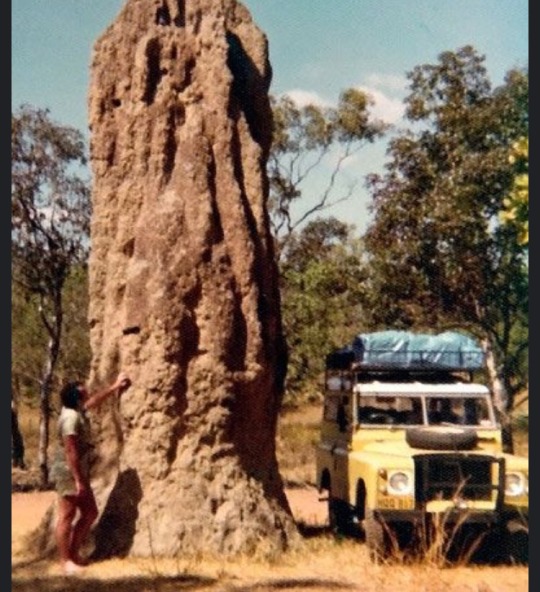
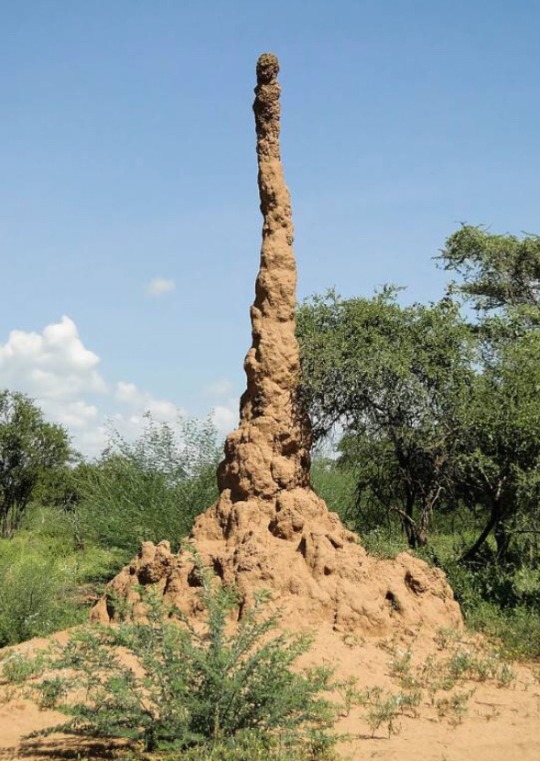
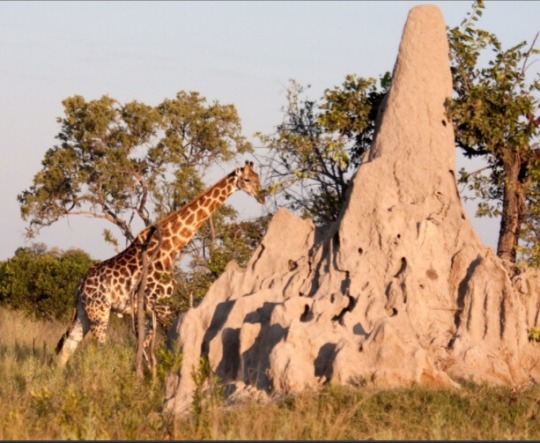
In my completely unrelated opinion, Zambia also boasts some really delicious cuisine.
#Zambia#such a cool country actually#it’s southern African but it’s sort of in the crossroads between east south and central#consequently it’s extremely linguistically and culturally diverse#africa#🇿🇲#fun facts#termites#bug facts#Southern Africa
5 notes
·
View notes
Text
ughghghghghhg white westerners shut the fuck up challenge
and to preface this. this is honestly abt the absolute bullshit that white ""leftists"" like to pull. like im sorry but half of u are white supremacist antisemites who make fun of genocides.
#haha potato#joke#not directed at anyone in particular#not at my mutuals or followers#politics#the next person to make a fucking joke within a km of me will be garrotted#slash j for legal reasons#like im sorry but if you think its okay to about genocide based on ethnic and religious grounds. go fuck yourself.#millions dying and being displaced is not a fucking joke for americans to laugh at.#and also. white americans. try to remember ur in a literal colonial state yea?#and maybe learn about other countries??#bc i am absolutely fucking certain that my african zionist friends are bullied by goyim who dont know shit about theology or geography#NB!!! african zionism =/= zionism. it is an african syncretist faith combining christianity and traditional southern african religions#it is NOT in support of the apartheid state of israel#and it is honestly racist to imply that it is.#also. not an expert on african zionism here. im sure there are people out there who are african zionists who can explain it a lot more#in depth and a lot better
2 notes
·
View notes
Text
#House of Lords#Sunak’s Rwanda asylum law#asylum seekers#Rwanda plan#England’s southern coast#House of Commons#Rishi Sunak#Downing Street Briefing Room#Prime Minister#press conference#Kimberly Rodrigues#Justin Welby#Archbishop of Canterbury#Conservative Party#election#illegal migrants#legal challenges#parliament#legislation#African country#lawmakers#political capital#boats#asylum#deportation#scrutiny#amendment#debate#victory#constitutional role
0 notes
Text
masterpost of horror lists
here are all my horror lists in one place to make it easier to find! enjoy!
sub-genres
action horror
analog horror
animal horror
animated horror
anthology horror
aquatic horror
apocalyptic horror
backwoods horror
bubblegum horror
campy horror
cannibal horror
children’s horror
comedy horror
coming-of-age horror
corporate/work place horror
cult horror
dance horror
dark comedy horror
daylight horror
death games
domestic horror
ecological horror
erotic horror
experimental horror
fairytale horror
fantasy horror
folk horror
found footage horror
giallo horror
gothic horror
grief horror
historical horror
holiday horror
home invasion horror
house horror
indie horror
isolation horror
insect horror
lgbtqia+ horror
lovecraftian/cosmic horror
medical horror
meta horror
monster horror
musical horror
mystery horror
mythological horror
neo-monster horror
new french extremity horror
paranormal horror
political horror
psychedelic horror
psychological horror
religious horror
revenge horror
romantic horror
dramatic horror
science fiction horror
slasher
southern gothic horror
sov horror (shot-on-video)
splatter/body horror
survival horror
techno-horror
vampire horror
virus horror
werewolf horror
western horror
witch horror
zombie horror
horror plots/settings
road trip horror
summer camp horror
cave horror
doll horror
cinema horror
cabin horror
clown horror
wilderness horror
asylum horror
small town horror
college horror
plot devices
storm horror
from a child’s perspective
final girl/guy (this is slasher horror trope)
last guy/girl (this is different than final girl/guy)
reality-bending horror
slow burn horror
possession
pregnancy horror
foreign horror or non-american horror
african horror
spanish horror
middle eastern horror
korean horror
japanese horror
british horror
german horror
indian horror
thai horror
irish horror
scottish horror
slavic horror (kinda combined a bunch of countries for this)
chinese horror
french horror
australian horror
canadian horror
decades
silent era
30s horror
40s horror
50s horror
60s horror
70s horror
80s horror
90s horror
2000s horror
2010s horror
2020s horror
companies/services
blumhouse horror
a24 horror
ghosthouse horror
shudder horror
other lists
horror literature to movies
techno-color horror movies
video game to horror movie adaption
video nasties
female directed horror
my 130 favorite horror movies
horror movies critics hated because they’re stupid
horror remakes/sequels that weren’t bad
female villains in horror
horror movies so bad they’re good
non-horror movies that feel like horror movies
directors + their favorite horror movies + directors in the notes
tumblr’s favorite horror movie (based off my poll)
horror movie plot twists
cult classic horror movies
essential underrated horror films
worst horror movie husbands
religious horror that isn’t christianity
black horror movies
extreme horror (maybe use this as an avoid list)
horror shorts
29K notes
·
View notes
Text
Central Bank of Lesotho facing outages after cyberattack
The central bank of southern African country Lesotho is facing severe outages due to a cyberattack that was discovered earlier this week.
The bank released multiple statements confirming that a recent incident affected several systems. The landlocked mountainous country is encircled by South Africa and has a population of more than 2 million.
“The Central Bank of Lesotho advises the public that,…

View On WordPress
1 note
·
View note
Text
As a Black South African, watching these horrific events unfold, I cannot but reflect on my country’s own violent past.
I recall the relentless planning and violence that accompanied the last decades of white South Africa’s attempts to make apartheid work. I remember the fears that grew among white South Africans as they put their trust in a sophisticated military capability, a conscription army, a nuclear weapons capacity and steadfast friends in the West, particularly the United States, Britain and France.
It was the height of the Cold War and South Africa claimed to be the only democracy in Southern Africa, protecting “civilisation” from the encroaching threats surrounding it.
Its military might and expansive police force were accompanied by a series of policies designed to maintain white minority rule.
Each attempt to impose new such policies failed in the face of mass resistance. The more they failed, the more brutal the violence meted out by the military and the police with the encouragement of white politicians and a terrified white electorate.
The “terrorists”, as the national liberation movements were referred to, could not be crushed by the mightiest army in Southern Africa. By mid-1985 a significant section of the white electorate and some in the ruling party realised that the problem of Black resistance was not going to go away. Something more drastic was going to be required.
. . . continues at Al Jazeera (16 Nov 2023)
3K notes
·
View notes
Text
South Africa’s genocide case has put the spotlight on a deeper fault line in global geopolitics. Beyond the courtroom drama, experts say divisions over the war in Gaza symbolize a widening gap between Israel and its traditional Western allies, notably the United States and Europe, and a group of nations known as the Global South — countries located primarily in the southern hemisphere, often characterized by lower income levels and developing economies.
Reactions from the Global North to the ICJ case have been mixed. While some nations have maintained a cautious diplomatic stance, others, particularly Israel’s staunchest allies in the West, have criticized South Africa’s move.
The US has stood by Israel through the war by continuing to ship arms to it, opposing a ceasefire, and vetoing many UN Security Council resolutions that aimed to bring a halt to the fighting. The Biden administration has rubbished the claim that Israel is committing genocide as “meritless,” while the UK has refused to back South Africa.[...]
As a nation whose history is rooted in overcoming apartheid, South Africa’s move carries symbolic weight that has resonated with other nations in the developing world, many of whom have faced the burden of oppression and colonialism from Western powers.
Nelson Mandela, the face of the anti-apartheid movement, was a staunch supporter of the Palestine Liberation Organization and its leader Yasser Arafat, saying in 1990: “We align ourselves with the PLO because, akin to our struggle, they advocate for the right of self-determination.”
Hugh Lovatt, a senior policy fellow with the Middle East and North Africa Programme at the European Council on Foreign Relations, said that while South Africa’s case is a continuation of its long-standing pro-Palestinian sympathies, the countries that have rallied behind it show deeper frustrations by the Global South.
There is “a clear geopolitical context in which many countries from the Global South have been increasingly critical over what they see as a lack of Western pressure on Israel to prevent such a large-scale loss of life in Gaza and its double standards when it comes to international law,” Lovatt told CNN.
Much of the non-Western world opposes the war in Gaza; China has joined the 22-member Arab League in calling for a ceasefire, while several Latin American nations have expelled Israeli diplomats in protest, and several Asian and African countries have joined Muslim and Arab nations in backing South Africa’s case against Israel at the ICJ.
For many in the developing world, the ICJ case has become a focal point for questioning the moral authority of the West and what is seen as the hypocrisy of the world’s most powerful nations and their unwillingness to hold Israel to account. [...]
Israel sided with the West against Soviet-backed Arab regimes during the Cold War, and Western countries largely view it “as a fellow member of the liberal democratic club,” he added.[...]
“But the strong support of Western governments is increasingly at odds with the attitudes of Western publics which continue to shift away from Israel,” Lovatt said.
Israel has framed the war in Gaza as a clash of civilizations where it is acting as the guardian of Western values that it says are facing an existential threat.
“This war is a war that is not only between Israel and Hamas,” Israeli President Isaac Herzog told MSNBC in December. “It’s a war that is intended – really, truly – to save Western civilization, to save the values of Western civilization.”
So far, no Western countries have supported South Africa’s case against Israel.
Among Western states, Germany has been one of the most vocal supporters of Israel’s campaign in Gaza. The German government has said it “expressly rejects” allegations that Israel is committing genocide in Gaza and that it plans to intervene as a third party on its behalf at the ICJ.
An opinion poll by German broadcaster ZDF this week however found that 61% of Germans do not consider Israel’s military operation in the Gaza Strip as justified in light of the civilian casualties. Only 25% voiced support for Israel’s offensive.
But it is in Germany’s former colonial territory, Namibia, that it has attracted the fiercest criticism.
The Namibian President Hage Geingob in a statement on Saturday chided Berlin’s decision to reject the ICJ case, accusing it of committing “the first genocide of the 20th century in 1904-1908, in which tens of thousands of innocent Namibians died in the most inhumane and brutal conditions.” The statement added that the German government had not yet fully atoned for the killings.
Bangladesh, where up to three million people were killed during the country’s war of independence from Pakistan in the 1970s, has gone a step further to file a declaration of intervention in the ICJ case to back South Africa’s claims, according to the Dhaka Tribune.
A declaration of intervention allows a state that is not party to the proceedings to present its observations to the court.
“With Germany siding with Israel, and Bangladesh and Namibia backing South Africa at the ICJ, the geopolitical divide between the Global South and the West appears to be deepening,” Lovatt said.
Traditionally, the West has wielded significant influence in international affairs, but South Africa’s move signals a growing assertiveness among Global South nations that threatens the status quo, says Adekoya.
“One clear pattern emerging is that the old Western-dominated order is increasingly being challenged, a situation likely to only further intensify as the West loses its once unassailably dominant economic position,” Adekoya said.
19 Jan 24
2K notes
·
View notes
Text
Eilat is situated on Israel’s southern coast on the Red Sea, linking the country to Asia and the Indian Ocean without the need to transit the Suez Canal, but its volumes had been in decline since a Q4 2022 spike saw the facility handle 124,000 tonnes, doubling its Q1 levels that year.
However, in a meeting with the Knesset’s Economic Affairs Committee on 7 July, CEO Gideon Golbert said there had been no activity at the port for eight months and no revenues coming in.
The port mainly handles bulk cargoes, potash and car imports as well as some containers is considerably smaller than the country’s Mediterranean ports of Ashdod and Haifa, but the effects of the Houthi attacks have clearly affected the Israeli trade.
On a broader scale the Houthi actions have diverted hundreds of container vessels every week on a much longer journey, some 4,000 miles longer, around the African cape to Europe, increasing the fuel costs, and emissions, with the first increment of the EU ETS introduced in January this year.
Conversely the Middle East conflict has given a significant boost to the secondhand container ship market, reports Alphaliner.
507 notes
·
View notes
Text
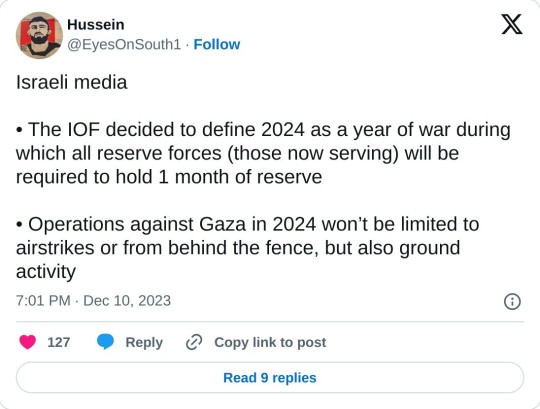
3 thoughts on this:
Economy - Israel's economy took a hit in October that was comparable to the economic tremors caused by the COVID-19 outbreak. It is effectively in a major recession today. The longer they drag out this war, the worse their economic condition will be. Foreign capital will continue leaving the country as it seems incapable of stabilising. While the continued use of reserves means 300,000 Israelis will be unable to work, not to mention the millions of dollars Israel has to spend to mobilise its reserve every day. The longer the war goes on, the more people will end up leaving the country. 470,000 have left in October and November with no intention of returning while over 300,000 settlers are internally displaced. Both of those numbers are bound to go up as the war continues. This means that Israel is missing hundreds of thousands of Israeli workers. A few weeks ago, Israel struck a deal with the Indian government to get 100,000 workers after tens of thousands of worker migrants fled the country. That plan fell through thanks to Indian trade unions. Now Israel is turning to African States in a desperate attempt to replace the Gazan workers it's currently genociding. We will see if that plan works as Africans are by and large pro Palestine. Plus the Yemeni naval blockade is growing more and more intense every week as a direct response to the genocide in Gaza. In short, Israel's economy can't withstand a long war. America cannot help prop up the economy as it will soon be facing its major economy issues in the coming years including a housing crisis and likely a recession.
Military defeats - Israel cannot defeat Hamas. It cannot win a war inside Gaza. It failed to do so in 2014, it's failing right now. It has lost hundreds of military vehicles including the (formerly) vaunted Merkava-4. The estimated number of injured soldiers stands at 10,000+ while the Resistance is still intact and capable of carrying out dozens of military operations against IDF and the surrounding cities and settlements every day. The IDF has never looked more weak than it is right now. Hezbollah has been employing a military strategy dubbed the escalation ladder, in which one end of the ladder is no war and the other end is total war. It has continuously escalated against Israel, attacking deeper and deeper into its territory, and it will continue until there's open war between Israel and Lebanon. The point of the escalation is to give Israel time to leave Gaza but as that's not something the Israeli government is planning on doing, we're looking at a region war in 2024 (so far we have a regional conflict and whilebits serious, it's not yet war). Just like it can't win in Gaza, Israel can't defeat Hezbollah and occupy Southern Lebanon like its leaders have been threatening to. It certainly can't take on the Ansar Allah group in Yemen.
West Bank - every week, there are clashes between Israeli forces and the Resistance in the West Bank and it's growing more and more intense. The best way to describe the region is 'powder keg.' Israel has responded to Oct 7th by detaining thousands of Palestinians and killing hundreds. There's a growing popularity of Al Qassam Brigades and other militant groups in Gaza. There also seems to be coordination between the Gazan and West Bank resistance groups, as in they would carry out operations at the same time. The longer the war on Gaza goes on, the more likely that war will also break out in the West Bank.
Many, many more Palestinians will die. This plan, more than anything, is a call for the continued slaughter of Palestinians in Gaza.
But the longer this goes on, the closer Israel gets to collapsing.
#yemen#jerusalem#tel aviv#current events#palestine#free palestine#gaza#free gaza#news on gaza#palestine news#news update#war news#war on gaza
1K notes
·
View notes
Text
"The Congo’s strategic location in the middle of Africa and its fabulous natural endowment of minerals and other resources have since 1884 ensured that it would serve as a theatre for the playing out of the economic and strategic interests of outsiders: the colonial powers during the scramble for Africa; the superpowers during the Cold War; and neighbouring African states in the post-Cold War era. To prevent a direct confrontation between the United States and the Soviet Union, the Security Council deployed from 1960 to 1964 what was then the largest and most ambitious operation ever undertaken by the UN, with nearly 20,000 troops at its peak strength plus a large contingent of civilian personnel for nation-building tasks.
This latter aspect of the Opération des Nations unies au Congo (ONUC) was a function of the fragile political revolution ... The Congo won its independence from Belgium on 30 June 1960. Patrice Lumumba’s MNC-L and its coalition of radical nationalist parties had captured a majority of seats in the lower house of parliament in the pre-independence elections in May. Lumumba became prime minister and head of government, while the Abako leader Joseph Kasa-Vubu became the ceremonial head of state. The victory of a militantly nationalist leader with a strong national constituency was viewed as a major impediment to the Belgian neocolonialist strategy and a threat to the global interests of the Western alliance.
Within two weeks of the proclamation of independence, Prime Minister Lumumba was faced with both a nationwide mutiny by the army and a secessionist movement in the province of Katanga bankrolled by Western mining interests. Both revolts were instigated by the Belgians, who also intervened militarily on 10 July, a day before the Katanga secession was announced. In the hopes of obtaining the evacuation of Belgian troops and white mercenaries, and thus ending the Katanga secession, Lumumba made a successful appeal to the UN Security Council to send a UN peacekeeping force to the Congo. However, the UN secretary-general, Dag Hammarskjöld, interpreted the UN mandate in accordance with Western neocolonialist interests and the US Cold War imperative of preventing Soviet expansion in the Third World. This led to a bitter dispute between Lumumba and Hammarskjöld, which resulted in the US- and Belgian-led initiative to assassinate the first and democratically elected prime minister of the Congo.
... Brussels’ failure to prevent a radical nationalist such as Lumumba from becoming prime minister created a crisis for the imperialist countries, which were determined to have a decolonization favourable to their economic and strategic interests with the help of more conservative African leaders. With Belgium’s failure to transfer power in an orderly fashion to a well-groomed moderate leadership group that could be expected to advance Western interests in Central and Southern Africa, the crisis of decolonization in the Congo required US and UN interventions. Working hand in hand, Washington, New York and Brussels succeeded in eliminating Lumumba and his radical followers from the political scene."
Georges Nzongola-Ntalaja, The Congo from Leopold to Kabila: A People's History, 2002
424 notes
·
View notes
Text
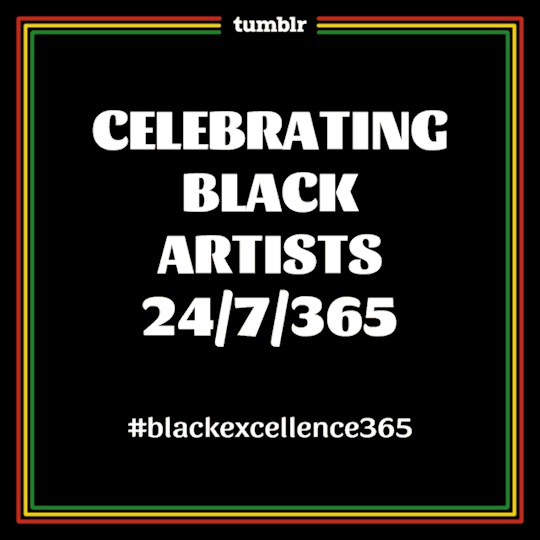
Art by @lehuckbadu
African Hair Threading
Hair Threading has been part of the Black hair scene for many generations. It consists of wrapping sectioned hair in thread. This method of wrapping the hair in thread strengthens the hair without excessive manipulation, which is beneficial for your strands. Not only does the style strengthen the hair, but it also promotes growth.
The style comes from Sub-Saharan African countries and grew its popularity in West Africa, particularly, South Nigeria. Learn more here
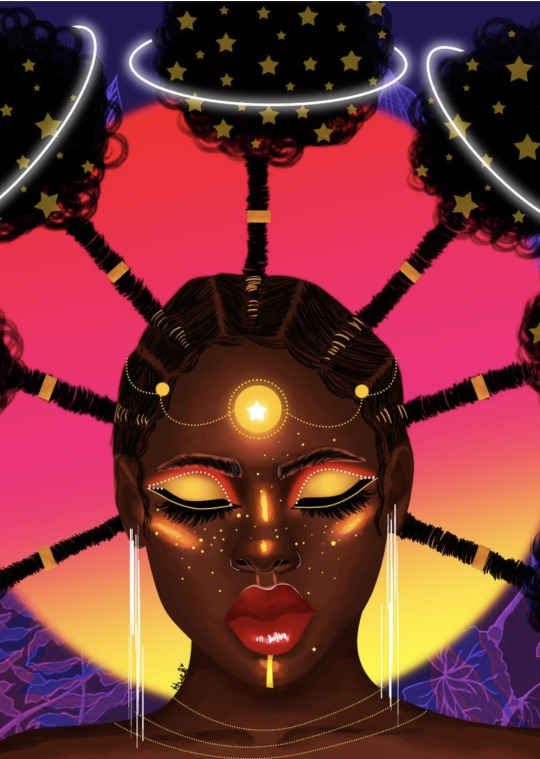
Art by Izzakko via @blacklacerabbit
Bantu Knots and Hi-Top Fades
The Zulu people of southern Africa originated Bantu knots, a hairstyle where the hair is sectioned off, twisted, and wrapped in such a way that the hair stacks upon itself to form a spiraled knot (Source). Learn the history of Bantu Knots
The hi-top fade or flattop originated in the U.S. military around the ‘40s and ‘50s. By the mid-eighties, Black barbers began to reimagine the hairstyle, and due to its resemblance to Queen Nefertiti’s Empress headpiece, some speculated the hairstyle's origin. The hairstyle grew as a trend when worn by the like of Grace Jones, Doug E. Fresh, and Salt-N-Peppa.
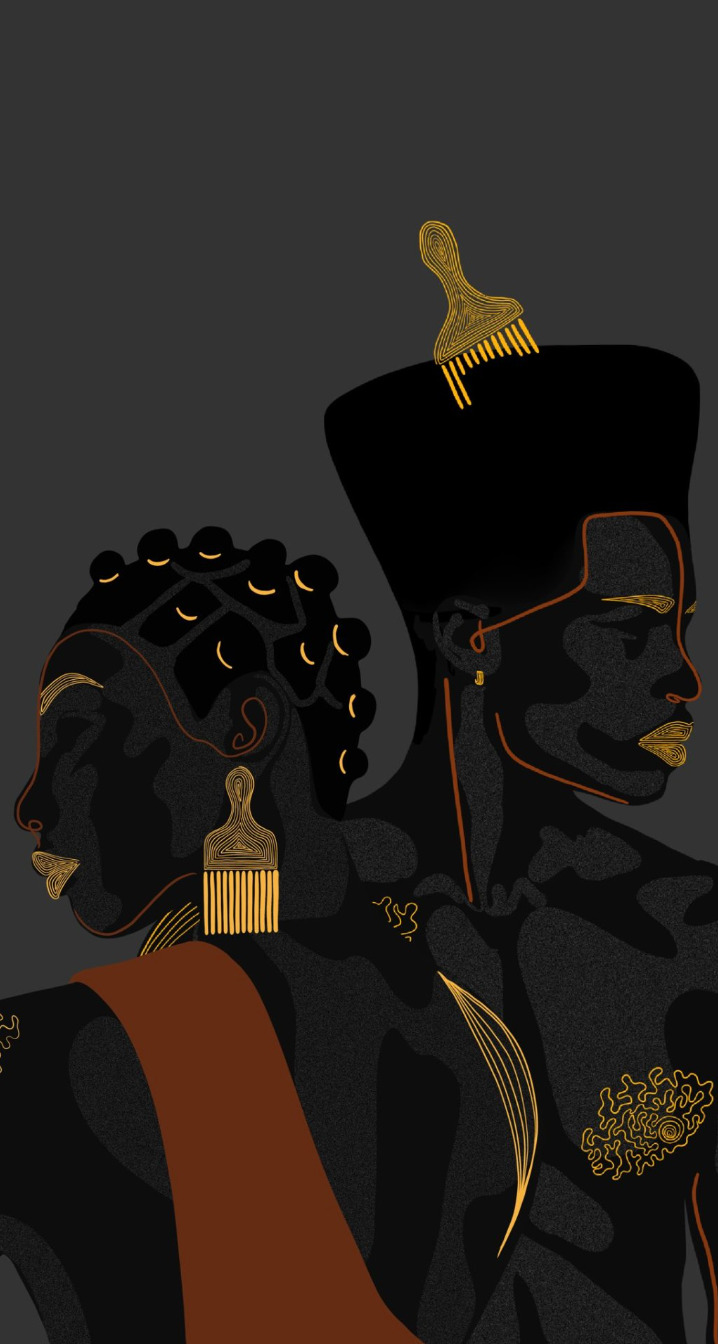
Art by LaQuecya Allen via @nappy-by-nature
Afro
As far as hairstyles go, there's nothing Blacker than the Afro. In the 1960s, after decades of subjecting themselves to European beauty standards, Black folks decided to take back their hair. This newfound self-acceptance was widely known as the Black Is Beautiful movement, which sprang from the Black Power movement. The 'fro was rocked by Angela Davis, Huey P. Newton, and Jesse Jackson while fighting oppression; the hairstyle quickly emerged as a symbol of Black beauty, liberation, and pride.

Remember: tag your Black hair art with #BlackExcellence365 for a chance to be featured!
And keep your eyes out for next month's theme... 👀
#blackexcellence365#blackjoyisblackexcellence#blackjoy#blackexcellence#black excellnece#black excellence 365#all black everything#celebrating black history month#celebrating black culture#black culture#black lives matter#today in black excellence#black artist on tumblr#blktumblr#black hair#black tumblr
6K notes
·
View notes
Text
white non-southerners on this site assume us southerners are trapped in inescapable desolate wastelands of illiteracy and poverty. I literally live in one of the cultural epicenters of the United States and I grew up around one of the most distinct African American communities in the country. some of you literally grew up in the segregated white suburbs where the spiciest thing around you was a Dunkin’ Donuts iced coffee that got a lil frothy in the car. like. look inwards people. my region might be a hellhole in its own way but at LEAST I didn’t grow up on casseroles and dad rock.
3K notes
·
View notes
Text
Today is Erev Yom Ha'Shoah (Eve of Holocaust Memorial Day) in Israel. It will be observed by Jews outside of Israel, too.

The Hebrew date was chosen to honor the outbreak of the Warsaw Ghetto Uprising. It's also a week before Erev Yom Ha'Zikaron Le'Chalalei Ma'archot Yisrael (Eve of Israel's Memorial Day for its Fallen Soldiers and Terror Victims), which is itself observed a day before Yom Ha'Atzmaut Le'Yisrael (Israel's Independence Day). A lot of people have remarked on the connection between the three dates. On Yom Ha'Atzmaut, we celebrate our independence, which allows us to determine our own fate, and defend ourselves without being dependent on anyone else, right after we remember the price in human life that we have paid and continue to pay for this independence, and a week before we mourn the price we've had to pay for not getting to have self defence during the Holocaust. NEVER FORGET that in one Nazi shooting pit alone (out of almost two thousand) during just 2 days (Erev Yom Kippur and Yom Kippur 1941), more Jewish men, women and kids were slaughtered than in the 77 years since Israel's Independence War was started by the Arabs. This unbreakable connection between the living and the dead, between our joy and our grief, is often addressed with the Hebrew phrase, במותם ציוו לנו את החיים, "With their death, they ordered us to live."

On this Erev Yom Ha'Shoah, I'd like to share with you some data, published on Thursday by Israel's Central Bureau for Statistics (source in Hebrew).
The number of Jews worldwide is 15.7 million, still lower than it was in 1939, before the Holocaust, 85 years ago (that is what a genocide looks like demographically).
7.1 million Jews live in Israel (45% of world Jewry)
6.3 million Jews live in the US (40% of world Jewry)
Here's the data for the top 9 Jewish communities in the world:
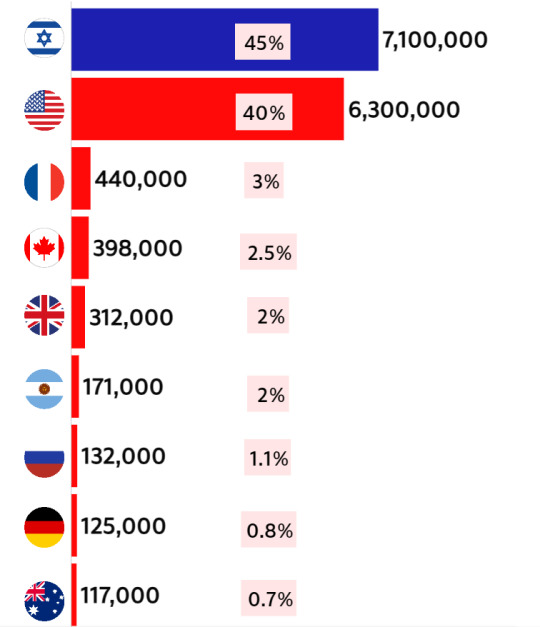
There are about 133,000 Holocaust survivors currently living in Israel. Most (80%) live in big cities in central Israel. Around 1,500 are still evacuated from their homes in northern and southern Israel due to the war (back in January, on International Holocaust Remembrance Day, there was a report about 1,894 survivors who also became internal refugees due to the war. Source in Hebrew). One Holocaust survivor, 86 years old Shlomo Mansour, is still held hostage in Gaza. He survived the Farhud in Iraq.
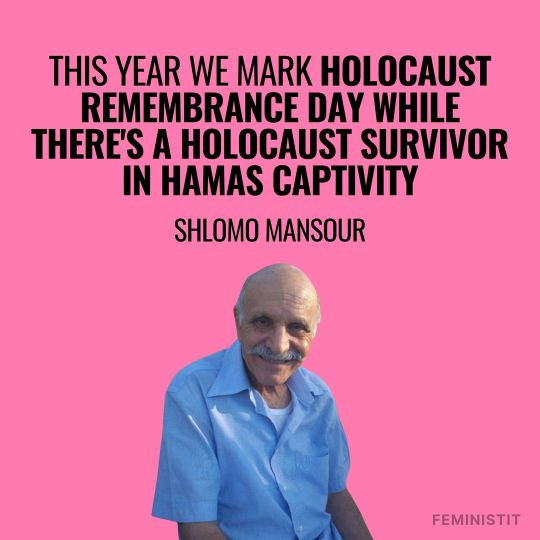
I haven't seen any official number for how many survivors had been slaughtered as a part of Hamas' massacre, despite everyone here being aware that Holocaust survivors had been murdered on Oct 7, such as 91 years old Moshe Ridler. Maybe, as we're still discovering that some people thought to have been kidnapped during the massacre, were actually killed on that day, no one wants to give a "final" number while Shlomo has not yet been returned alive.
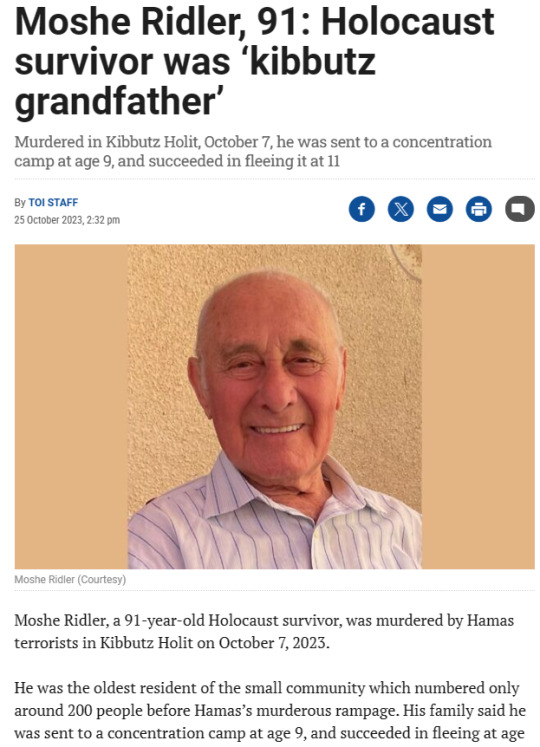
Out of all Israeli Holocaust survivors, 61.1% were born in Europe (35.8% in the countries of the former Soviet Union, 10.8% in Romania, 4.9% in Poland, 2.9% in Bulgaria, 1.5% in Germany and Austria, 1.3% in Hungary, 4.2% in the rest of Europe), 36.6% were born in Asia or Africa (16.5% in Morocco, 10.9% in Iraq, 4% in Tunisia, 2.6% in Libya, 2.1% in Algeria, 0.5% in other Asian and African countries) and 2.3% were born elsewhere.
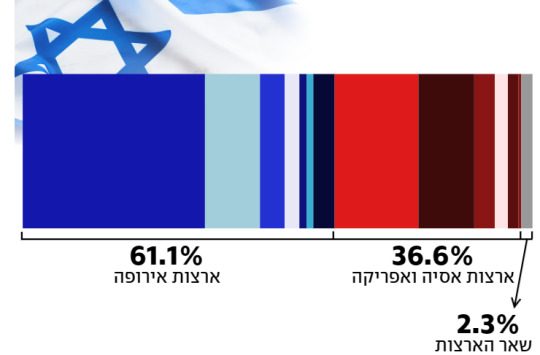
Out of all Holocaust survivors in Israel, 6.2% managed to make it here before the establishment of the state, despite the British Mandate's immigration policy against it (up until May 13, 1948). 30.5% made it to Israel during its very first years (May 14, 1948 until 1951), another 29.8% arrived in the following decades (1952-1989), and 33.5% made Aliyah once the Soviet Union collapsed, and Jewish immigration to the west (which included Israel) was no longer prohibited by the Soviet regimes (1990 on).
The second biggest community of survivors in the world is in the US, the third biggest (but second biggest relative to the size of the population) is in Australia. I heard from many Holocaust survivors who chose to immigrate there that they wanted to get "as physically far away from Europe as possible."
For a few years now, there's been this project in Israel, called Maalim Zikaron, מעלים זיכרון (uploading memory. Here's the project's site in Hebrew. In English it's called Sharing Memories, and here's the English version of the site) where Israeli celebs are asked to meet up with a Holocaust survivor (it's done in Hebrew), and share the survivor's story and the meeting on their social media on Erev Yom Ha'Shoah (which is today). Each year, there's also one non-Israeli Jewish celeb asked to participate (in English. This time around it's Michael Rapaport, he's meeting Aliza, an 81 years old survivor from the Netherlands, who was hidden along with 9 other Jewish babies for two years. He uploaded a preview of his meeting with her here, where he asked her what it means to her to be a Jew, and from what I understand, he will upload more today to the same IG account). This year, there will be an emphasis on Holocaust survivors who also survived Oct 7 (with 6 of the 20 participating survivors having survived Hamas as well). Here's a small bit from an interview with one such survivor, 90 years old Daniel Luz from kibbutz Be'eri:
(for all of my updates and ask replies regarding Israel, click here)
#israel#antisemitism#israeli#israel news#israel under attack#israel under fire#terrorism#anti terrorism#hamas#antisemitic#antisemites#jews#jew#judaism#jumblr#frumblr#jewish#israelunderattack#shoah#holocaust
466 notes
·
View notes